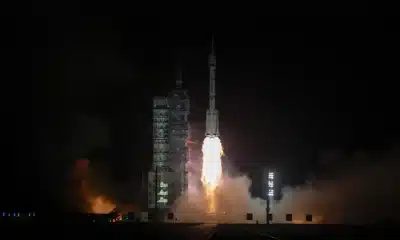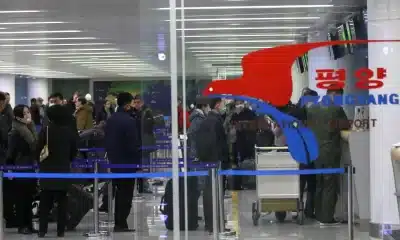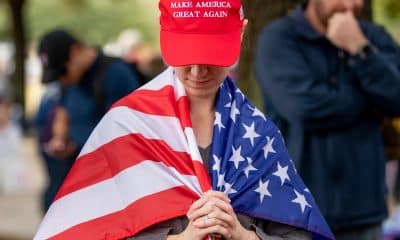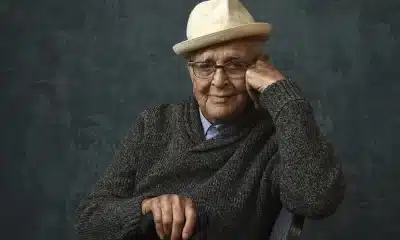Election News
Justin Trudeau Refutes CSIS Report on China’s Election Meddling, Targets Whistleblower
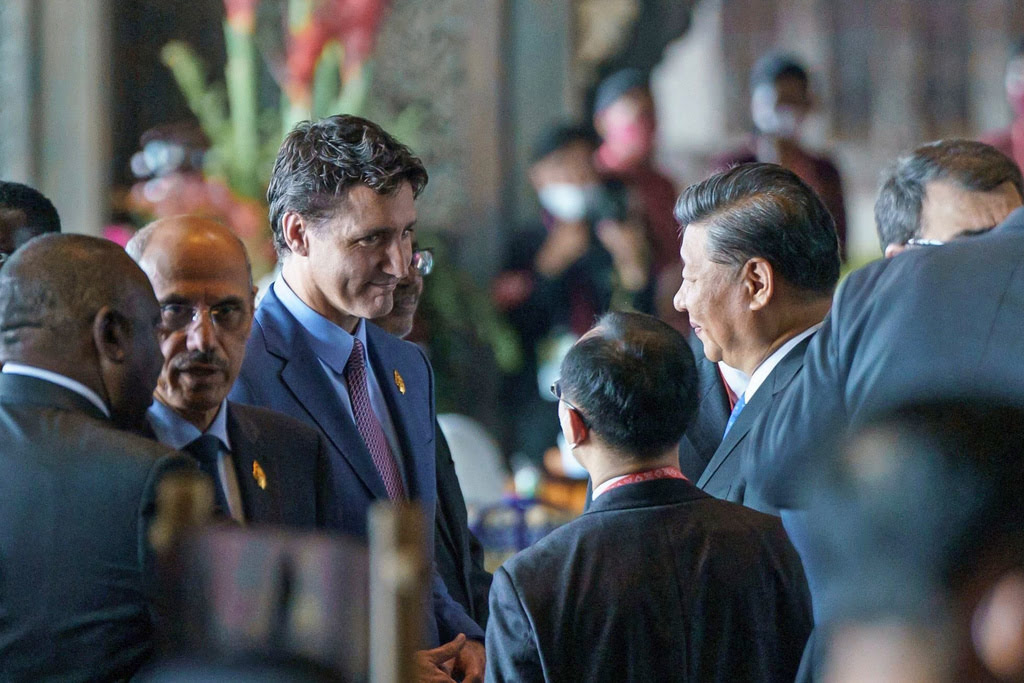
Prime Minister Justin Trudeau said on Wednesday that foreign meddling in elections is a serious issue, and Canada must be vigilant against it after a whistleblower at CSIS leaked that China aided in influencing the outcome of the 2021 election.
“We are seeing systematic attempts at interference by countries like China and Russia and others who want to destabilize democracies,” Trudeau told reporters in Richmond Hill, Ontario.
The Globe and Mail newspaper reported last week that Chinese diplomats and their proxies worked to defeat Conservative politicians considered more hostile to Beijing, citing secret and top-secret Canadian spy agency documents. The documents also showed that China supported Trudeau’s re-election, albeit with a parliamentary minority, which was the outcome.
Conservative Pierre Poilievre said it’s time for Prime Minister Justin Trudeau to stop making self-serving statements and tell Canadians the truth about China’s attempts to meddle in the 2021 elections.
Just trust me is Justin Trudeau’s message in response to allegations of Chinese election meddling in the 2019 and 2021 campaigns.
Trudeau Says Don’t Trust the CSIS Leaks
The Prime Minister responded to questions about the issue for the third time in a week and, as with the previous two attempts, came up with a new story — those leaks are false.
That’s right, after claiming last week that he was concerned about CSIS security and hoped they would find the leaker, he then claimed yesterday that asking questions about these allegations undermines democracy. Trudeau is now warning Canadians not to trust the leaked CSIS information.
“We are very concerned about the CSIS leaks, particularly because they contain so many inaccuracies,” Trudeau said.
Last week The Globe and Mail reported on CSIS documents their reporters saw detailing Chinese diplomats’ efforts to ensure the Trudeau Liberals’ re-election in 2021. The report said China has been meddling in Canadian internal affairs for years.
Trudeau quickly pointed to his government’s decision to form a task force to monitor for outside election interference in 2019. The first report provided no details on outside interference attempts and mostly summarized interference in other countries.
The Toronto Sun reports the second report on the 2021 election has yet to be made public, even though the voting day was 18 months ago.
“Canadians can have faith in the integrity of our elections,” Trudeau said on Thursday. “The election integrity was maintained in both 2019 and 2021.”
He claimed to have been assured of this by the panel’s civil servants. However, he could not explain why their report had not been made public.
Essentially, Trudeau again says to trust him and don’t ask questions.
Trudeau has also accused the Conservatives of blowing everything out of proportion and raising concerns about his lack of oversight. It’s a baseless claim based on partisan political games, Trudeau said.
Many believe Trudeau’s handling of the report raises suspicion because he appears to have something to hide.
When Global first reported on CSIS informing the government of Chinese election meddling in 2019, Trudeau never denied it. He and his ministers discussed the issue without admitting that Global was incorrect.
Later his ministers said that Trudeau was never briefed, but that was the extent of their denial. “There was no foreign interference in a way that would have significantly changed any of the results,” Trudeau said.
Brian Lilley: Justin Trudeau more concerned with whistleblower
However, Don Matin of CTV News says the ultimate goal of China’s interference was to help China’s preferred Liberals win just enough seats to secure another minority mandate. This kept Canada’s government accountable to opposition parties while paralyzing Parliament with infighting and electoral uncertainty.
Even though the news broke on the Friday before a long weekend, with the media largely focused on releasing the Rouleau Report into the use of the Emergencies Act, it’s jaw-dropping stuff that should be impossible for a sitting prime minister to ignore.
Despite this, Justin Trudeau seems far more concerned with a CSIS leak he wanted to be discovered and fixed, Martin says.
Going on to say, it defies belief that Trudeau would soft-pedal this story because China’s goal was to help elect his Liberal government, but there isn’t much else to explain this prime minister’s passivity toward spy agency concerns while focusing on finding the source of the leak.
Liberal outrage should be unleashed in double-barreled cannon fire. The Chinese ambassador should be called in for a carpet crawl and possible expulsion. As a bare minimum, the prime minister should launch an independent investigation into these explosive allegations.
However, the prime ministerial pattern appears fairly clear: if you see no evil, speak no evil, and study no evil, no evil will be found.
At the very least, Trudeau should follow the lead of the United States and establish a registry of foreign agents in Canada. It’s a no-brainer, especially in light of these revelations, but the Trudeau government is still pondering the idea.
Election News
Indians Cue in Sweltering Heat to Vote in the World’s Largest Election
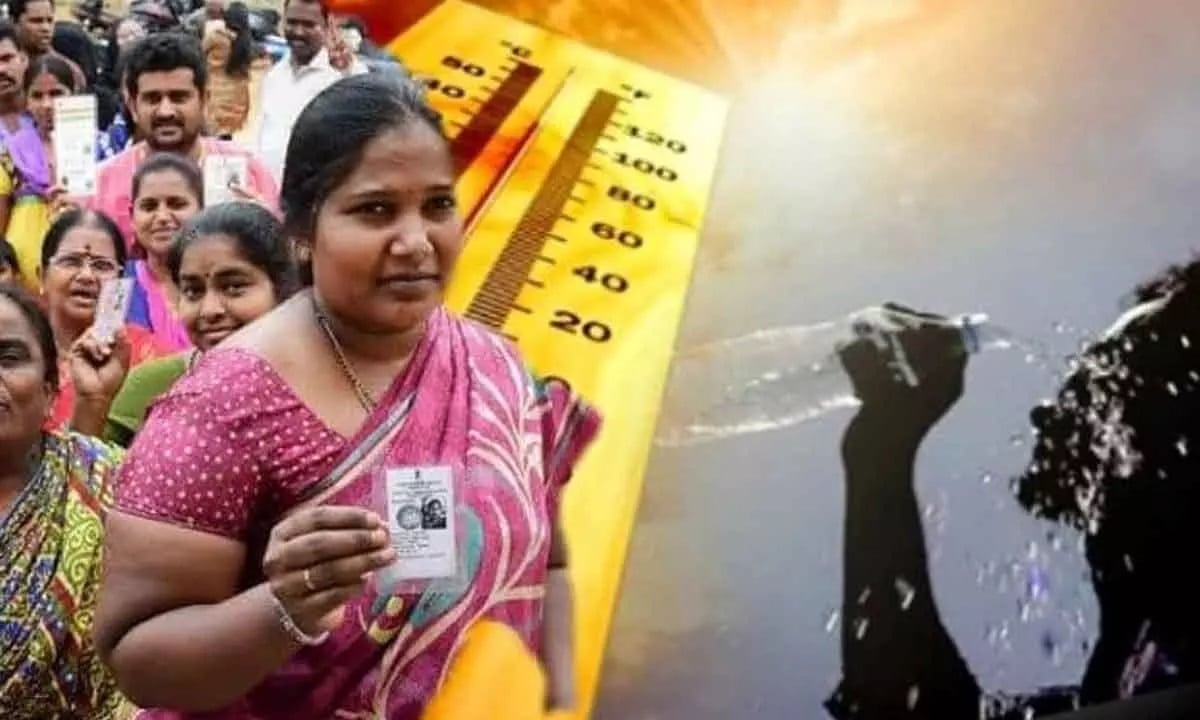
Indian voters are braving sweltering heat to vote in the world’s largest election, as a severe heat wave strikes sections of the country and authorities predict a hotter-than-normal summer for the South Asian nation.
According to the India Meteorological Department (IMD), a heat wave will continue to strike regions of south and east India till the end of the week, including four states voting on Friday.
Parts of West Bengal, Bihar, Uttar Pradesh, and Karnataka are among the 13 states and union territories voting in the second phase of India’s massive elections, with temperatures expected to reach 40 degrees Celsius in some regions.
According to the IMD, Baripada in the eastern state of Odisha reached 43.6 degrees Celsius on Thursday, while Khammam in Telangana reached 43.4 degrees Celsius. The IMD warned last month that India would likely experience larger and longer heat waves this year due to above-normal temperatures.
Gandhi Ray, a 60-year-old farmer from eastern Bihar, said he lives in a small hut in the forest and plans to go to a nearby hamlet to vote.
According to the IMD, temperatures will exceed 41 degrees Celsius every day until May 1 in his homeland of Banka district.
“It’s important for me to vote but definitely every day this heat is getting worse and worse,” he was quoted as saying by CNN. “I generally work outside, so I’m used to it, but as I get older, it’s more difficult to cope. Now my children have taken up the majority of the work.”
Worlds Biggest Election
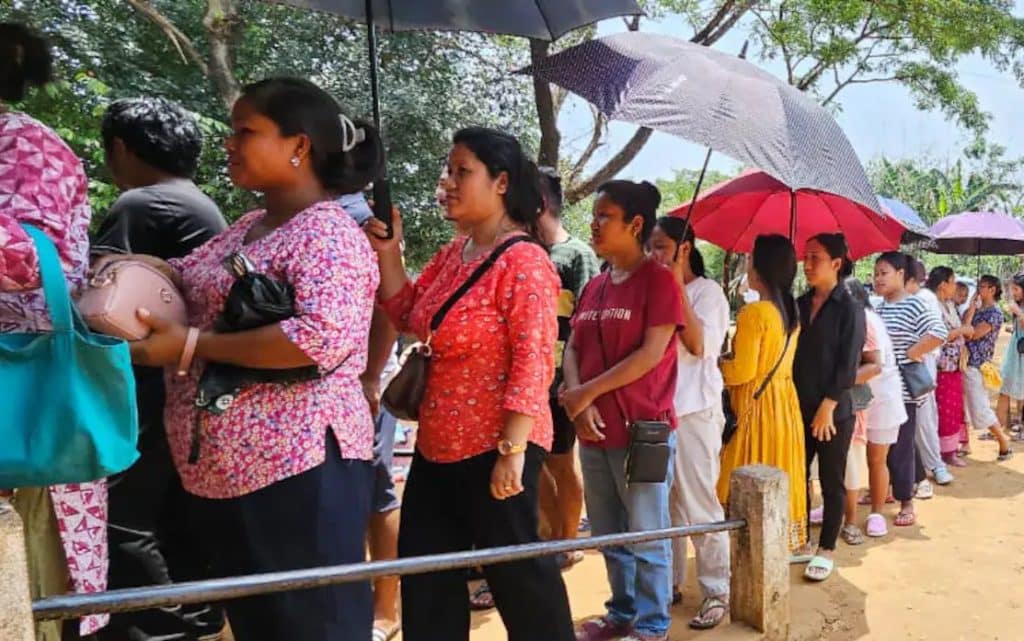
Lok Sabha Elections 2024 Phase 2 Polling: AFP Image
High temperatures have sparked worry during election season, as outdoor political events draw thousands of people under the scorching heat. The issue was highlighted Wednesday when a politician fell from heat while addressing supporters in western Maharashtra.
The Election Commission, National Disaster Management Authority, and IMD organized a task group to reduce the impact of heat waves ahead of polling days, and Prime Minister Narendra Modi presided over a conference earlier this month to assess the country’s readiness for the hot season.
The Election Commission has issued instructions for remaining cool at polling locations, which include drinking water and bringing an umbrella, as well as warning against leaving children or pets in parked automobiles.
In Bihar, election officials have extended voting hours at several polling sites “in view (of the) prevailing heat wave.” Ray said the heat won’t deter him from voting on Friday.
“This is the one right we have so of course I will vote, everyone should vote for whomever they want to represent them,” he added.
“Of course it would be good if the election took place in a cooler time but whether I go to vote or not, I am still going to feel hot so that’s not going to stop me.”
Cuing in India’s Sweltering Heat to Vote
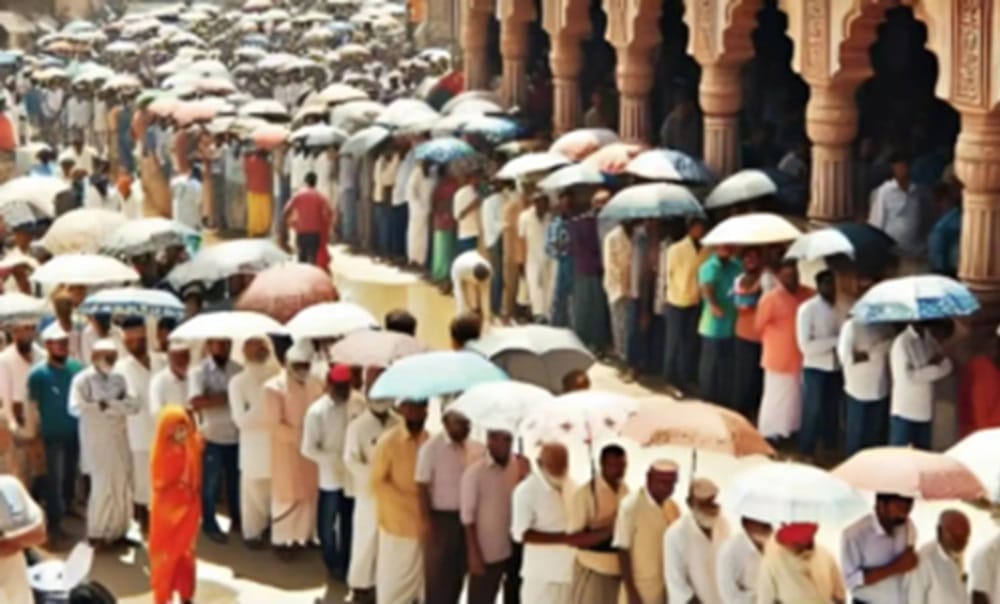
Indians Cue in Sweltering Heat to Vote in the World’s Largest Election: Image Times of India
Despite the heat warnings, the Election Commission stated that there are “no major concerns for heat waves” during Friday’s polling, and weather projections predict “normal conditions” for the constituencies voting.
India, the world’s most populous country with 1.4 billion inhabitants, frequently endures heat waves in the summer months of April, May, and June.
Last year, multiple heat waves struck India, closing schools, destroying crops, and putting a strain on energy supplies. In June alone, temperatures in some sections of the country reached 47 degrees Celsius, killing at least 44 people and afflicting hundreds with heat-related ailments.
Extreme heat has already had an impact on the region this year, with hundreds of millions of people living in climate-vulnerable areas seeing no reprieve from punishing heat and humidity.
According to scientist Maximiliano Herrera, neighboring Bangladesh is experiencing a heat wave this week, with temperatures above 40 degrees Celsius in numerous regions and no break from record hot nights. On Thursday, the government proclaimed a “heat alert” across the country, which will last 72 hours.
Extreme temperatures are also rising across Southeast Asia, with local media reporting dozens of heatstroke deaths in Thailand, hundreds of school closures in the Philippines, and droughts drying up rice fields and waterways in Vietnam’s Mekong Delta “rice bowl” region.
Heatwave Thailand
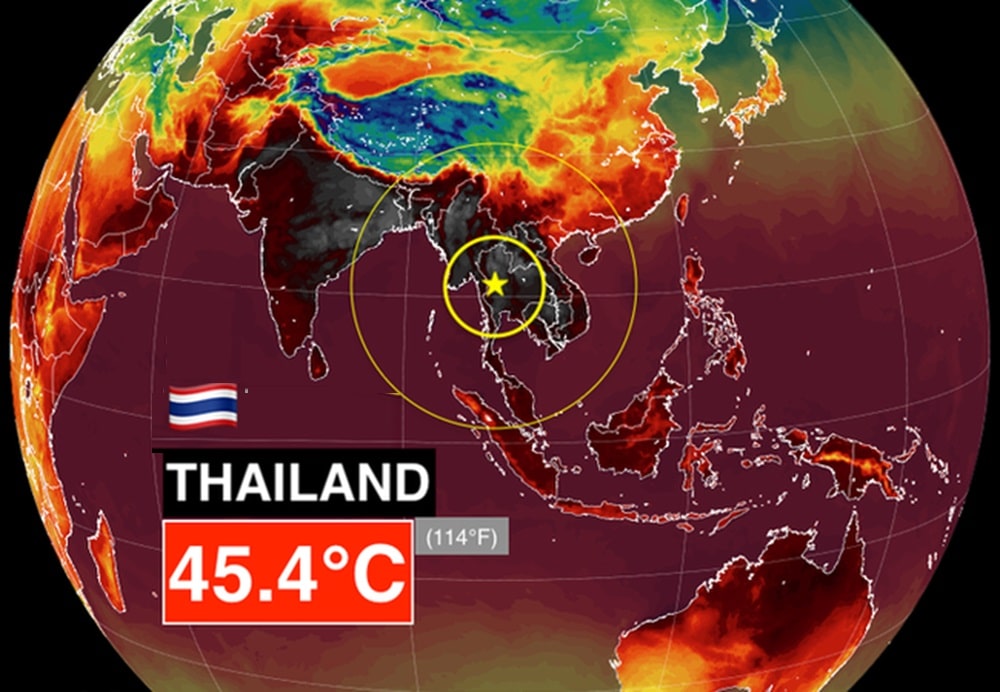
Heatwave-Thailand: CTN News Image
Thailand’s Meteorologist Department issued further warnings about extremely hot weather over the weekend, and the health department stated that heatstroke had already killed at least 32 people.
Bangkok municipal officials issued an excessive heat warning, forecasting that the temperature would top 44 degrees Celsius. Temperatures in Thailand’s capital reached 43 degrees Celsius on Friday, with similar highs forecast next week.
Bangkok’s environment department issued a warning that the heat index was “extremely dangerous”.
A wave of extremely hot weather has hammered South and Southeast Asia this week, forcing schools to close and worshippers to pray for rain. Authorities in northern Thailand’s Udon Thani province have also warned of high temperatures throughout the weekend.
Temperatures in several provinces are expected to reach record highs of 43 to 45 degrees Celsius. Thailand’s health ministry said late Friday that 32 people have died from heatstroke this year, compared to 37 in all of 2023.
Direk Khampaen, deputy director-general of Thailand’s Department of Disease Control, said officials advised the elderly and those with underlying medical conditions, such as obesity, to stay indoors and drink plenty of water.
According to Save the Children, Vietnam’s weeks-long heat wave has prompted three provinces to declare a state of emergency as salt seeps into fresh water sources, limiting access to drinking water for over 70,000 households.
According to a report released Tuesday by the World Meteorological Organization, Asia will remain the world’s most disaster-prone region in 2023, and the region is warming faster than the worldwide average.
Source: CNN
Election News
Biden Administration Plans for Potential Presidential Transition
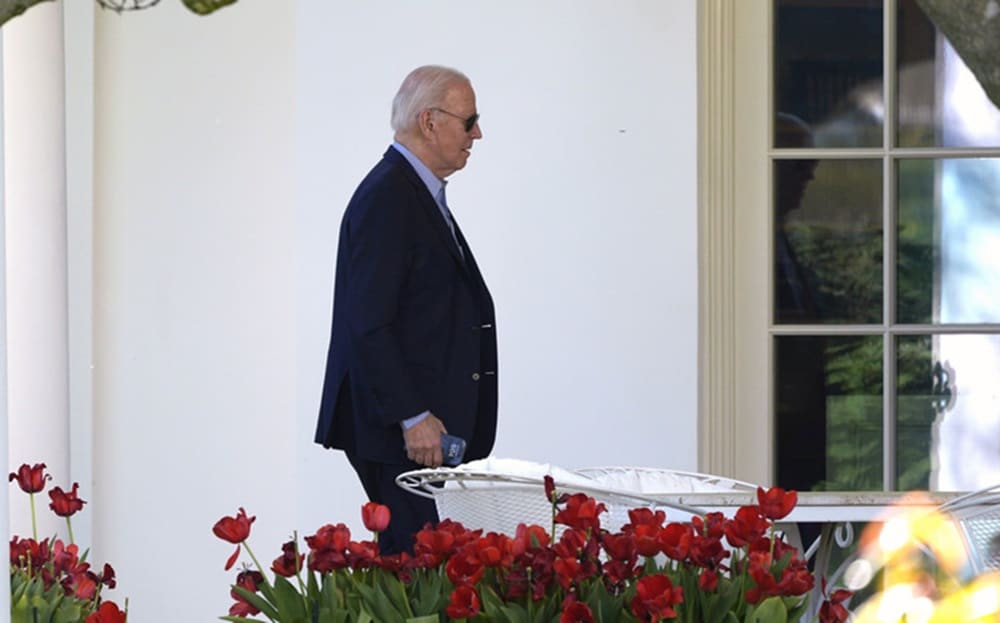
On Friday, President Joe Biden’s administration formally began preparations for a prospective presidential transition, with the goal of ensuring government continuity regardless of the outcome of November’s general election.
Shalanda Young, director of the Office of Management and Budget, wrote memorandum to all executive departments and agencies instructing them to designate a focal person for transition preparation by May 3. It’s the standard initial step in congressionally mandated presidential transition planning.
Next week, White House Chief of Staff Jeff Zients, who also chaired Biden’s 2020 transition effort, will lead the first meeting of the White House Transition Coordinating Council, which is made up of senior White House policy, national security, and management officials as required by the Presidential Transition Act.
The act gives government assistance to major party candidates in preparing to govern so that they can have personnel in place to implement policy initiatives on their first day in office.
Biden’s plan for a handover
Making sure presidential candidates are prepared to take over the federal government became a higher priority following the 9/11 attacks, and the act has been updated several times since then to provide additional resources to candidates and to require incumbents to plan for a handover with even greater intensity.
Young’s letter is remarkably identical to one delivered by Trump administration acting director Russell Vought four years ago, for a transition process that began well but became disrupted when then-President Donald Trump refused to admit defeat to Biden.
It took until November 23, two weeks after the election, for Trump’s General Services Administration to declare Biden the “apparent winner” of the 2020 contest, a necessary step before the transition could begin.
Inauguration Day
The legislation compels presidential contenders and the General Services Administration to strike an agreement on everything from federal office space to access to sensitive information by September 1, but it is frequently accomplished sooner. Before signing the memorandum of understanding, candidates must formally obtain their party’s nomination at their respective conventions.
Transition teams begin assessing applicants for positions in a future administration, including starting the time-consuming security clearance process for potential appointees who must be ready to assume office on Inauguration Day.
Biden launched a separate task force in February to address the “systemic” problem of mishandling classified information during presidential transitions, just days after a Justice Department special counsel’s sharply critical report revealed that he and his aides had done so when he left the vice presidency in 2016.
Source: Yahoo News
Election News
Election Week in India Sparks Violence and Hate Speech
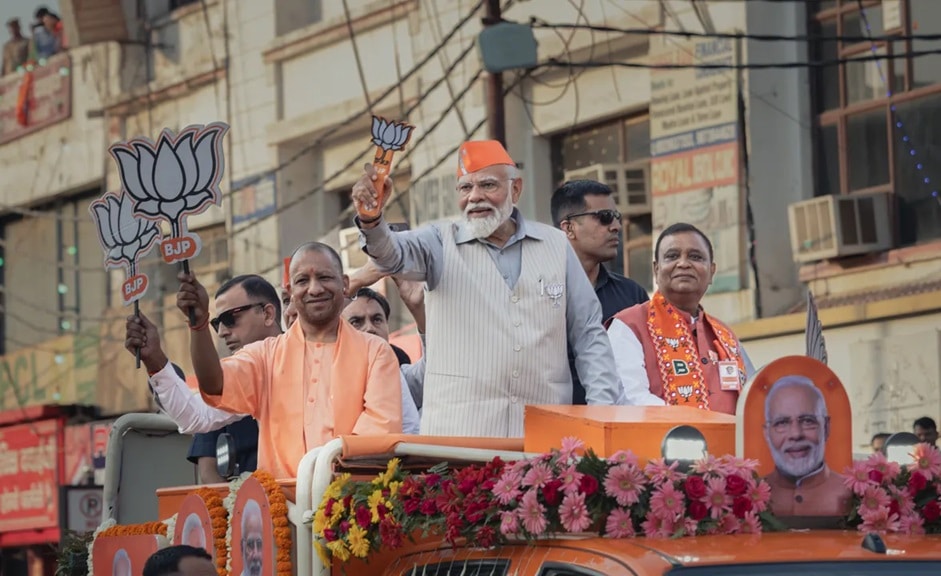
It is not Election Day in India; rather, it is Election Week. Plural. CNBC reported that voters in “the world’s largest democratic election” began voting last Friday, marking the first of seven phases of voting that will take place over six weeks.
There are unlikely to be many shocks at the end of that marathon: Prime Minister Narendra Modi and his Hindu-nationalist Bharatiya Janata Party (BJP) are predicted to win “another landslide victory,” giving Modi a third five-year term in office.
That does not imply that the campaign has been uneventful. The New York Times reported that “armed men attacked polling stations and captured voting booths” in the state of Manipur, forcing authorities to rerun early voting.
Modi faced accusations of “hate speech” late in the campaign, CNN said, after telling a Hindu audience that Muslim opponents provide “your hard-earned money” to “infiltrators.”
Following the election, there were numerous AI-generated deepfake videos featuring Bollywood actors condemning Modi.
Speaking at a general election rally, India’s prime leader labeled Muslims as ‘infiltrators’ who ‘have the most children.’ He did not name them.
The mask did not take long to fall off. Two days after polling opened for the legislative elections, which will culminate on June 1, Narendra Modi, who is driving the campaign for his party, went on an openly Islamophobic rant.
Muslims in India
On Sunday, April 21, at a rally in Rajasthan’s tribal district of Bhanswara, the Indian prime minister insulted and vilified Muslims without mentioning them.
He accused the Congress, the main opposition party, of attempting to transfer national riches “to those who have the most children, the infiltrators,” adding that his predecessor, Manmohan Singh, had declared that Muslims had “the first right to the nation’s resources.”
“That means they will collect all of your wealth and distribute it to who? – To those with the most children. They will spread it among the infiltrators.
Do you think your hard-earned money should go to the infiltrators? Do you approve of that?” He challenged the audience to applaud.
His comments recalled an ancient cry of Hindu nationalists and a doctrine they established, the Great Replacement doctrine, also known as “love jihad.”
His party, the Bharatiya Janata Party (BJP), claims that Muslims, who number over 200 million people in India, constitute a demographic threat to Hindus by producing children and overtaking Hindus demographically.
They seduce Hindu ladies with the sole purpose of converting them.
Muslims and Christians
Since Modi took office in 2014, numerous BJP-ruled states have introduced anti-conversion laws, stigmatizing and threatening religious minorities such as Muslims and Christians, whose members can face imprisonment for just wanting to convert Hindus.
The Rashtriya Swayamsevak Sangh (RSS), the BJP’s largest far-right organization, has declared Muslims to be national foes. From 1940 onwards, it was directed by Golwalkar, who was inspired by Adolf Hitler and saw Nazi Germany as an example of racial pride.
Modi praised this important individual, who stated that minorities should be handled in the same way that the Nazis treated Jews. Christians and Muslims posed internal threats to this supporter of a Hindu India.
The prime minister’s statements, which are typically more cautious, triggered a surge of outrage.
On Monday, the Congress referred the case to the electoral commission, seeking for sanctions against “blatant targeting,” “divisive, reprehensible, and malicious,” of “a particular religious community.” The electoral code prohibits inciting communitarian attitudes.
However, the government now controls this independent organization, which is in charge of ensuring that elections go smoothly and that the code of conduct is followed. In March, the administration selected two election commissioners with ties to the BJP.
-
Entertainment5 months ago
Robert Downey Jr. Won’t Be Returning To The Marvel Cinematic Universe As Tony Stark
-
Politics5 months ago
Unveiling the Power and Influence of The Conservative Treehouse
-
Sports4 months ago
Saints’ Aggressive Play-Calling Ends Up Coming Back To Hurt Them In Loss To Rams
-
Business5 months ago
Tesla’s Cybertruck Hits The Market With A Higher Price Tag And Plenty Of Challenges
-
Innovation5 months ago
Sony Debuts First PS5 Controller For Disabled Gamers
-
Celebrity5 months ago
Norman Lear, Producer Of TV’s ‘All In The Family’ And Influential Liberal Advocate, Has Died At 101


